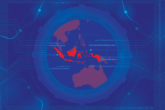February 12, 2018
Strategic Innovation and Great Power Competition
At this time of disruptive transitions, the new U.S. National Defense Strategy rightly recognizes that the character of warfare is changing due to the advent of a range of disruptive technologies.[1,2] In particular, the strategy highlights rapid advances in advanced computing, big data analytics, artificial intelligence (AI), autonomy, robotics, directed energy, hypersonics, and biotechnology, which are characterized as “the very technologies that ensure we will be able to fight and win the wars of the future.”[3] The emergence of and unique convergences among these technologies could transform current paradigms of military power in uncertain, unpredictable ways. In addition, since commercial developments have been a primary driver of recent progress in many of these disparate technologies, the diffusion of advances will occur much more quickly and prove difficult to constrain, especially with the free exchange of ideas and talent across borders. In recent history, military-technical advantage has been a key pillar of U.S. military predominance. However, today’s trends, including China’s rapid emergence as a scientific powerhouse, seem unlikely to allow for the U.S. or perhaps any actor to achieve uncontested edge, and poor policy choices could lead to disadvantage.
Read the full article in Strategy Bridge.
More from CNAS
-
Siliconsciousness: The AI Competition: Public Policy Strategies: Part 1
This episode comprises the first part of our special event, “The AI Competition: Public Policy Strategies”. The event, co-hosted by MIT Technology Review, brings together some...
By Dr. ED McGrady
-
How Drones in Ukraine Are Reshaping War
Samuel Bendett, a senior adjunct fellow at the Center for a New American Security, joins The Cipher Brief to discuss the current situation of drones being used in Ukraine.Watc...
By Samuel Bendett
-
Countering the Digital Silk Road: Indonesia
This year marks the 10th anniversary of the Digital Silk Road (DSR), China’s ambitious initiative to shape critical digital infrastructure around the world to advance its geop...
By Vivek Chilukuri & Ruby Scanlon
-
How Secure Is America’s AI Advantage?
https://www.youtube.com/watch?v=7njJkH7XRa8...
By Paul Scharre



